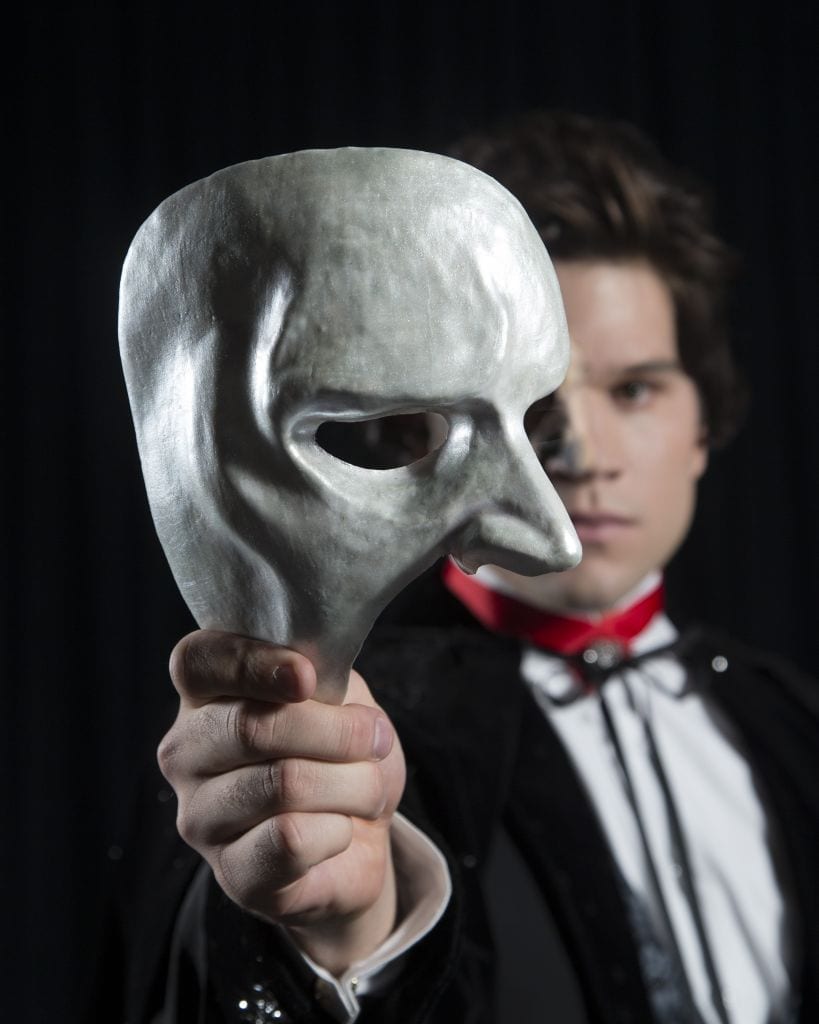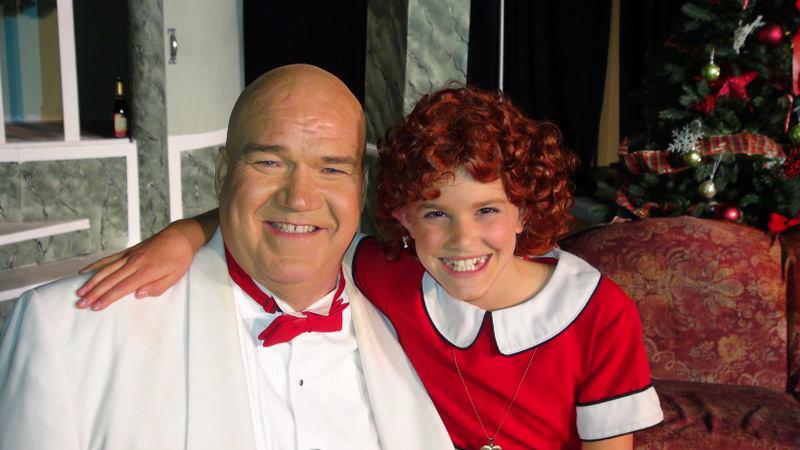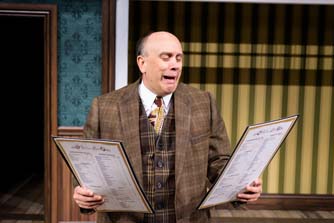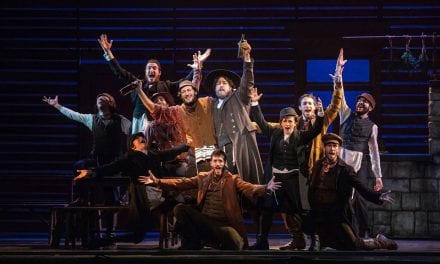PROVO — It’s hard to believe that it’s been 25 years since The Phantom of the Opera had its debut in the United States. In that time it’s become a fixture on Broadway, been assimilated into modern culture, and earned more money than the two highest-grossing movies worldwide . . . combined. Even those who aren’t fans of musicals or theatre know about the deformed genius who lurks in the catacombs beneath the Paris Opera House. As popular as The Phantom of the Opera is, this classic Andrew Lloyd Webber musical (with lyrics by Charles Hart and Richard Stilgoe and a book by Stilgoe and Lloyd Webber based on a novel by Gaston Leroux) hasn’t been seen in Utah outside of high schools since the national tour visited Salt Lake City several years ago. Brigham Young University has decided to mount the first professional-quality Utah production of The Phantom of the Opera, an undertaking that requires boundless ambition and talent. Luckily, BYU has both in ample supply.

Show closes Feburary 2, 2013.
Preston Yates stars as the tortured title character. Yates has a voice that is clear, strong, and gorgeous from his very first notes in the score. Yates’s vocal performance was technically proficient, and also—more importantly—emotionally fulfilling. Yates clearly understood how to move beyond the notes of the score and turn the music into an integral part of his portrayal of the Phantom. This was most apparent in “Music of the Night” and the finale number. In these songs, the Phantom’s emotional connection with Christine was raw and uninhibited. Yates made me see how visceral the Phantom’s yearning for Christine was and how difficult it was for him to see her fall in love with another man. I was also pleased by how vulnerable Yates made the Phantom, especially in the first scene in his lair and at the end of the first act. Although the character is a murderer, a kidnapper, and an extortioner, Yates still made me feel sympathy for the Phantom because of the human insecurities that the character showed.

The Phantom (Preston Yates) and Christine Christine (DeLaney Westfall).
Matching Yates’s power on stage in every way was DeLaney Westfall as Christine Daee. Westfall has the charm necessary to command the spacious stage of the de Jong Concert Hall singlehandedly, such as in “Wishing You Were Somehow Here Again” and “Think of Me.” Westfall also has a powerful voice that seems to have few limits. She handled the challenging title song and “Past the Point of No Return” with a forcefulness that is rarely heard in those songs. But Westfall also knows when a large stage and a sprawling epic musical demand subtlety, and her touching “All I Ask of You” and her scenes with Raoul (played by Tim Cooper) were tender and showed the soft, vulnerable side of the character.
Tim Cooper’s Raoul was also endearing, although the character doesn’t get nearly as much stage time as he should. Cooper’s masculine yet comforting demeanor was an asset to his performance, and made it very clear why Christine would fall in love with him. Cooper’s strongest moment was in “All I Ask of You” (one of the greatest love duets of the musical theatre canon, and a song that Cooper and Westfall deserve limitless praise for), which showed Raoul as a strong pillar in Christine’s life who also had genuine affection and caring for his frightened love.

Raoul (Tim Cooper) and Christine (DeLaney Westfall).
Brad Robins and Sam Bostwick were a charming duo as Monsieur André and Monsieur Firmin, respectively. The two are both exceptional vocalists, but what I liked best about their performances was the fact that—for the first time that I’ve ever seen—they distinguished their characters from one another and infused them with individuality. Usually the two characters are completely interchangeable and lack any uniqueness. I was grateful for this break in tradition that Robins and Bostwick provided.

Monsieur Andre (Brad Robbins), Piangi (Brannon Killgo) Carlotta (Caroline Morris) and Monsier Firmin (Sam Bostwick).
Caroline Morris was the insufferable diva Carlotta Giudicelli; although Carlotta would be a nightmare to work with in real life, Morris’s performance was so appealing that as the character become more temperamental, I loved her more. So, of course, “Prima Donna” was a complete joy to watch. Brannon Killgo‘s Ubaldo Piangi was a nice support for Carlotta, and Killgo’s vocal control during the more complex songs (like “Prima Donna”) was the backbone to some of the most intricate parts of the score.
Although my praises for the performances in The Phantom of the Opera are high, they are surpassed by my admiration for Tim Threlfall‘s directing. Having seen the Phantom national tour as recently as 2008, the film version, and the 25th anniversary concert version, I thought that I was thoroughly familiar with the show and everything it had to offer. But Threlfall surprised me multiple times with new stage tricks, such as the use of the fly system, each of which delighted me completely. As nice as the spectacle was (and The Phantom of the Opera is never short of spectacle), Threlfall understood that at its heart The Phantom of the Opera is the story of a love triangle. This basic kernel of the plot was constantly reinforced whenever two of the three main characters (i.e., Christine, the Phantom, and Raoul) were on stage, especially in “All I Ask of You,” the finale, and the end of “Masquerade.” I think that the emphasis of this human element of the story was a more important ingredient to the success of this production than all the technical wizardry on stage.

Carlotta (Caroline Morris) and Piangi (Brannon Killgo).
And there is plenty of technical wizardry. I know that I’ll remember the projections of animations, still images, and video (produced by Tess Kelly with Gary Groth as director of photography), which served as scenery or as visual commentary on the action on stage. Some of these images were gorgeous works of art in their own right, and the use of video was at times quite haunting (such when the Phantom and Christine were en route to his lair). The costumes (designed by Janet L. Swenson, Angela Robinson, Chelsea Roberts, and Deanne E. DeWitt) were opulent and perfectly appropriate for each character. I appreciated how the four costume designers clearly delineated which characters were dressed to perform in an opera and which characters were dressed in their everyday clothes (with the latter being more functional and completely unstylized). DeWitt’s costumes for “Masquerade” deserve special mention; the entire scene was a visual feast as each character danced around in shimmering costumes and masks. Every costume was unique, and the bright colors and unconventional look of the performers’ clothes lent a festive air to the scene that was abruptly shattered when the Phantom arrived. If DeWitt had not created such stunning costumes, then the change in mood at the end of the scene would have not been so drastic.

Piangi (Brannon Kilgo), Carlotta (Caroline Morris), (Raul) Tim Cooper), Christine (Delaney Westfall), Monsieur Andre (Brad Robbins) and Monsieur Firmin (Sam Bostwick).
Another technical element that merits attention is Douglas Olsen’s sound design. Thanks to Olsen’s work, when the Phantom’s voice emerged from the darkness, it almost always sounded like it was coming from a specific location in the theater. I even turned around to face the direction that the sound was coming from because the illusion was so convincing. Olsen also created an eerie sound effect for the breaking chandelier, which left me in awe as the intermission started.
It’s impossible to talk about The Phantom of the Opera without talking about its music, which is one of the most soaring and beautiful scores of the Broadway stage. From the first powerful chords of the overture, the BYU Symphony Orchestra (under Christian Smith’s direction) ensured that it was going to put the orchestra on the show’s Broadway soundtrack to shame. The large size of the orchestra gave added power to the loud, climactic numbers (like “Past the Point of No Return,” “Prima Donna,” and the title song). But the musicians also provided tender underscoring and emotion to some scenes. My only complaint about the orchestra (and one of my few complaints about the show as a whole) is that towards the end of each act the string section gradually grew out of tune.
Gayle Lockwood’s masterful music direction is undoubtedly the reason I have so much praise for the vocal and instrumental music of this production. I don’t know how she did it, but Lockwood somehow made it seem like the Phantom’s songs were specifically written for Yates. His voice seemed to fit the music perfectly, and the music direction for him and all of the soloists seemed to be both technically and dramatically exquisite. I was also impressed by how well executed the chorus numbers were. The ensemble had clear, crisp diction that helped me easily comprehend lyrics that usually I have to strain to understand (especially in “Hannibal” and the “Don Juan” rehearsal scene). The chorus members also had beautifully blended harmonies that added richness to the already profound score.
Overall, BYU’s The Phantom of the Opera is a production that compares very favorably with other professional productions of the show. Indeed, in some aspects it even surpasses every other production of the play that I’ve ever seen. Unfortunately, with both previews and all 15 performances already sold out, BYU’s production has much too short of a run. Those who are lucky enough to have their tickets already are in for a magical night of theatre. It’s an experience I’ll cherish for years to come because I’m skeptical that I’ll soon see another Phantom that was as entrancing as this production.

The Phantom (Preston Yates).






